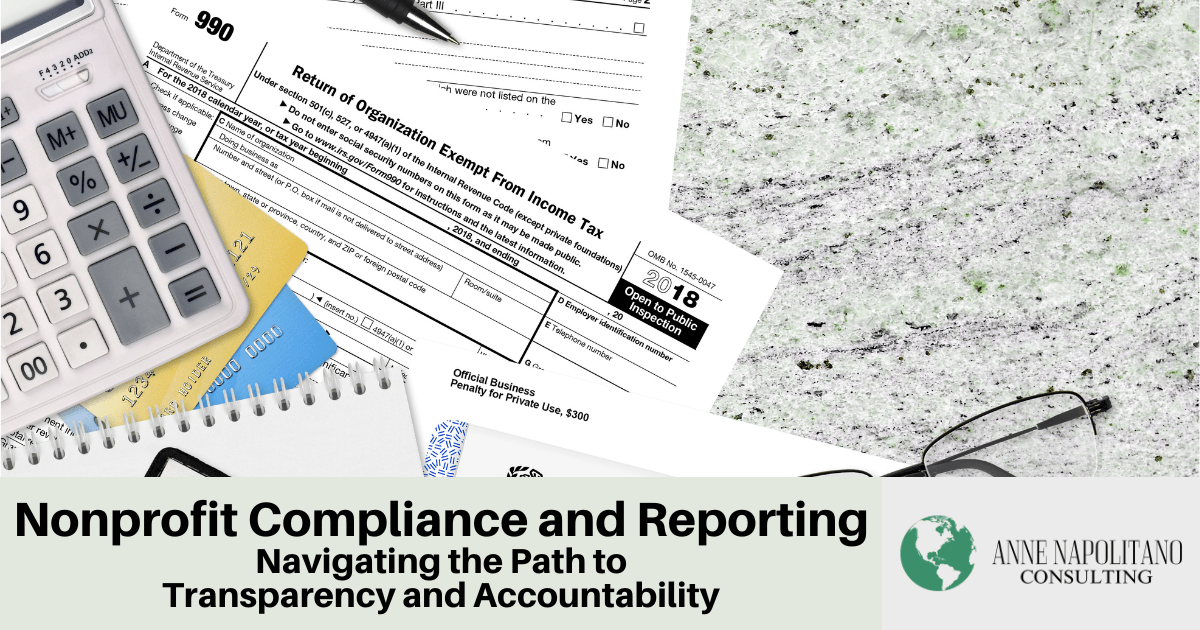
In this article, we delve into the critical aspects of nonprofit compliance, from filing IRS Form 990 to conducting independent audits, to ensure that your organization operates with integrity and fulfills its obligations.
In the realm of nonprofit organizations, transparency and accountability are paramount. As stewards of a mission, nonprofits are entrusted with funds, resources, and the responsibility to create meaningful impact. To uphold these values, nonprofits must adhere to specific compliance requirements and reporting obligations.
Understanding Nonprofit Compliance
Nonprofit compliance involves adhering to a set of legal and regulatory requirements that govern the activities and operations of charitable organizations. These regulations are designed to ensure transparency, accountability, and responsible management of funds. Meeting compliance obligations not only upholds the reputation of your organization but also maintains the trust of donors, stakeholders, and the community.
Filing IRS Form 990: Transparency in Financial Reporting
IRS Form 990 is more than just a regulatory requirement; it’s a powerful tool for showcasing your nonprofit’s dedication to transparency and responsible stewardship. This annual information return is submitted to the Internal Revenue Service (IRS) and is accessible to the public. It provides a comprehensive snapshot of your organization’s financial health, programmatic activities, and governance practices.
For nonprofit leaders, Form 990 serves as an opportunity to tell your organization’s story beyond the numbers. It allows you to highlight your accomplishments, outline your goals, and share your vision for the future. By embracing Form 990 as a platform for transparency, nonprofit leaders can reinforce donor trust, attract potential supporters, and contribute to the overall credibility of their organization. As you gather the necessary financial data and narrative explanations for Form 990, remember that this report not only fulfills regulatory obligations but also empowers your organization to communicate its impact effectively to a wide audience.
Complying with State and Federal Regulations
In addition to federal regulations, nonprofits must navigate state-specific requirements that vary based on location and activities. State regulations cover areas such as charitable solicitation, registration, and reporting. Staying informed about these regulations and meeting the necessary requirements is essential to maintain compliance at both state and federal levels.
Conducting Independent Audits: Ensuring Financial Integrity
Independent audits play a pivotal role in nonprofit compliance. Conducted by external auditors, these thorough examinations of your organization’s financial statements verify their accuracy and provide assurance to stakeholders. Independent audits are especially critical for nonprofits receiving significant grants, as many grantors require audited financial statements as part of their due diligence process.
Conducting independent financial audits is an essential practice that goes beyond compliance—it’s a demonstration of your organization’s commitment to accountability. Audits provide an unbiased assessment of your financial practices and internal controls. They not only instill confidence in donors and stakeholders but also help identify areas for improvement in your financial management.
Effective Governance Practices: Board Oversight and Accountability
Strong governance practices are fundamental to nonprofit compliance. A well-structured board of directors with diverse skills and expertise helps guide the organization and ensures that decisions align with the mission. Regular board meetings, transparent decision-making, and documented policies contribute to accountability and effective governance, ensuring your organization operates in alignment with its mission and values.
Demonstrating Impact: Outcome Reporting
Compliance extends beyond financial reporting. Nonprofits must also demonstrate the impact of their programs and services. Outcome reporting highlights the tangible results of your organization’s work and shows how you’re fulfilling your mission. This transparency reassures donors and stakeholders that their support is making a difference.
When reporting, focus on impact metrics and outcomes that highlight how your organization is making a difference. Quantify your achievements whenever possible. Sharing success stories, testimonials, and quantifiable data not only engages your audience but also reinforces the value of your work.
Partners in Your Success
Nonprofit compliance and reporting are not just legal obligations; they are the cornerstones of an ethical and responsible nonprofit sector. By adhering to these requirements, nonprofits uphold transparency, accountability, and trust.
In addition to providing accounting for nonprofit organizations, the Anne Napolitano Consulting team is committed to guiding nonprofits through the intricacies of compliance and reporting, allowing organizations to focus on their missions with confidence. Let’s work together to ensure your organization’s integrity and success. Schedule your free consultation with Anne Napolitano Consulting today. We want to be partners in your success.
